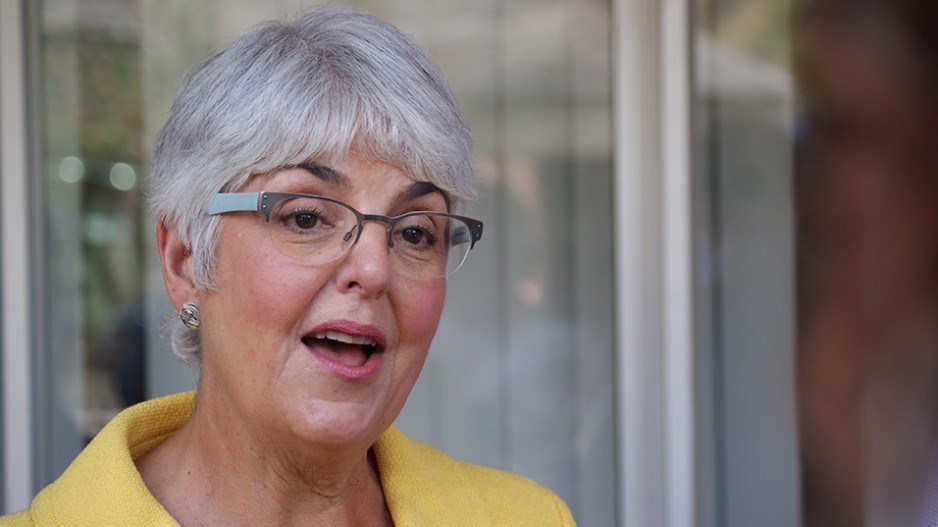On February 18, B.C. Finance Minister Carole James delivered a provincial budget that projected a $227 million surplus for 2020-21 and provincial GDP growth of 2%.
She didn’t even get to pass it in the legislature when, one month later, a state of emergency was declared that locked down much of B.C.’s economy, left thousands suddenly unemployed, suspended the legislative assembly and promised to blow holes in James’ financial plan.
In response, her government announced $5 billion in emergency funding, which is equal to about 12% of its 2020-21 revenue and expenditures.
But, according to the Ministry of Finance, the emergency spending won’t have an impact on the 2020-21 budget. It is borrowed money that will have to be paid down over a period of years.
The bigger impact to this year’s budget – the passing of which will be one of the first orders of business when the legislature resumes sitting June 22 – will come from a sudden decrease in tax revenue.
“There is no question that it’s going to be a challenging number of years,” James said last week at a virtual town hall meeting sponsored by the Greater Vancouver Board of Trade. “And I say ‘number of years’ because I don’t think there is a quick fix for the economy in British Columbia. Every sector has been impacted.”
Central 1 Credit Union is predicting B.C.’s economy will shrink by 7.4% in 2020. Given that the province was estimating a 2% increase in GDP, the implication for the B.C. government’s 2020-21 budget is a 9.4% economic contraction.
The government estimates $150 million to $200 million in revenue for every 1% of GDP growth.
So the government could be facing a revenue loss of between $1.5 billion and $2 billion for a single budget year, according to Bryan Yu, deputy chief economist for Central 1 Credit Union.
Even though the budget includes $2.3 billion in allowances and contingencies, Yu said it’s inevitable the provincial government will be dealing with deficits this year and in future budgets.
“There’s no chance that we’re going to see any type of a balanced budget or a surplus this year – that’s pretty clear,” Yu said. “But I think we have to be very clear that we’re still in a pretty good position relative to other provinces.”
One big government revenue uncertainty is the extent of permanent business closures in the province.
In addition to an expected drop in tax revenue from lower sales and income taxes, the province deferred several tax hikes that had been planned for April 1. They include increases to the carbon tax, PST and new employers health tax – now deferred until October. It also lowered the school tax portion for municipal property taxes by 25%.
When the budget was tabled, B.C. was leading the country in every economic indicator: employment, GDP growth and provincial government finances.
“What a lot of economists look at, as the most important number, is the debt-to-GDP ratio, and that will certainly be going up quite sharply, although not as badly as it has sometimes in the past,” said James Brander, an economist at the University of British Columbia’s Sauder School of Business.
“B.C. is in a better position than any other province in Canada and in a better position than most states in the U.S. or most other jurisdictions.”
Provided there is no second COVID-19 wave and a second lockdown, Brander said, “this will be a significant bump in the road, but we’ll get through it, and it’s not that bad.”
The 2020-21 budget includes major commitments to child-care funding and to record capital spending for roads, schools, hospitals and other public works – all of which James said should aid in the province’s economic recovery.
“That’s already built-in – over $20 billion,” James said of the capital spending. “That will help us in our recovery, but it’s also critical to make sure that we’re building British Columbia and building the infrastructure that’s going to help our economy.”
Child care is often viewed merely as a social program, but she said it’s important to business.
“Child care is also a huge economic driver. And I think COVID has pointed that out to us. If people don’t have good quality child care that’s affordable, we don’t get people back into the work place.”
Also fortuitous for B.C. is that multibillion-dollar energy projects – the $12.6 billion Trans Mountain pipeline expansion, the $6.6 billion Coastal GasLink pipeline and the $17 billion LNG Canada plant in Kitimat – are already under construction.
Those projects will see billions spent in B.C. over the next few years.
But Brander said the pandemic has exposed one major weakness in B.C.’s operating budget: health care. Thousands of elective surgeries were cancelled, and B.C. hospitals are now dealing with a major backlog.
“Before COVID, B.C. had very long waiting lists and a really backed-up health-care system,” Brander said. “Obviously COVID has been terrible for the health care system. Right now, nobody’s complaining about what the government has done, and I think they did the right thing. But as the COVID crisis lifts, and it’s no longer viewed as a crisis, the … terrible backlogs in the system will become an issue. I think it’s going to be hard for the government to clean that up because it’s really pretty bad.” •




